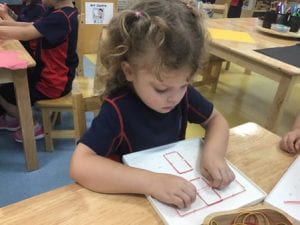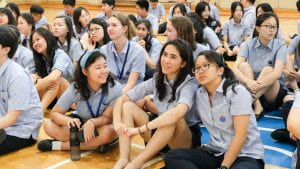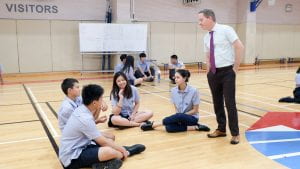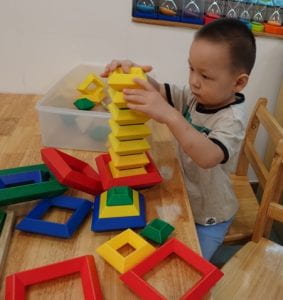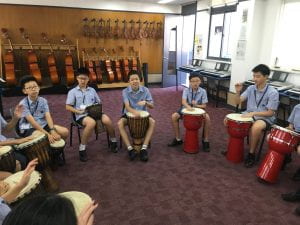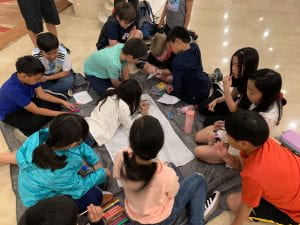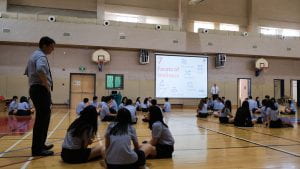Perhaps you have heard the term ‘Life Skills’ around the YCIS Pudong campuses recently, and might be wondering what this is? In fact, Life Skills is the school’s holistic approach to child development, and it is a progressive curriculum with age-appropriate activities and resources for all year levels, developed within the organisation and our school specifically over the past two years.
The curriculum focuses on six key areas of development for children of all ages. These include: Transitions, Personal Safety, Body & Health, Relationships, Identity, and Digital Citizenship/Safety, and they are incorporated into the learning for students in very intentional ways.
But why is this a focus, beyond the normal academic subjects students study, such as Science, Mathematics, or language learning? The answer is, when a child learns these skills they develop their own sense of security, trust, and self-esteem within their environment, and they become more confident. The Life Skills programme allows children to be seen from a holistic viewpoint and enhances their feelings of self-worth and self-esteem. This provides children with a secure foundation where they feel more competent and capable, allowing them to explore and expand their learning at new levels.
 The Life Skills programme was developed from our work on Child Protection. To share more about the Life Skills programme, three YCIS Pudong teacher experts on the subject, Ms. Juliette Broomhall, Early Childhood Student Support Coordinator, Ms. Andrea Griego, Primary Character Education and Life Skills Coordinator, and Mr. Dwayne Todd, Secondary Physical Education / Life Skills Teacher, share more about how the programme is implemented for children at different stages, and about the benefits students experience as a result.
The Life Skills programme was developed from our work on Child Protection. To share more about the Life Skills programme, three YCIS Pudong teacher experts on the subject, Ms. Juliette Broomhall, Early Childhood Student Support Coordinator, Ms. Andrea Griego, Primary Character Education and Life Skills Coordinator, and Mr. Dwayne Todd, Secondary Physical Education / Life Skills Teacher, share more about how the programme is implemented for children at different stages, and about the benefits students experience as a result.
Life Skills for Our Youngest Learners
This programme was implemented last year for Early Childhood Education (ECE) children, and the aim is to teach children skills so they can keep themselves safe and to increase their confidence within the classroom, and beyond.
You may be thinking, “What types of Life Skills do toddlers need to learn?” In fact, children need to learn skills for negotiation, problem solving, and conflict resolution all from a very young age. Introducing rules and boundaries for young children in the classroom allows fairness and safety for all children. One of the methods that is successful for young children within ECE classroom settings are visual reminders. Having expectations displayed creates opportunities for young children to reflect and problem solve. For example, sharing is an expectation in classroom environments. Young children are able to use sand timers to promote taking turns and sharing. When this skill is developed, they will often self-initiate this as a way to negotiate and successfully problem solve with their peers, promoting fairness and a sense of accomplishment for children.
The life skills programme is integrated into the ECE curriculum through intentional planning and by using teachable moments within the classroom environment. Teachers are able to use child-led interests to introduce a wide range of skills, making them more meaningful and in context with what the current interests may be within each unique class.
The programme is taught by the class teachers, as they know each child best and they have established the strong, trusting relationships needed to implement the Life Skills programme, but occasionally, special guest visitors, such as nurses, doctors, or police officers are invited to provide knowledge about a topic of interest for the classroom.
For children in ECE, as they learn about the various topics in the curriculum, they develop core skills that improve their self-awareness, agency, and empowerment. Each year level has specific objectives and outcomes that are aimed at the child’s developmental age; for example: the area of ‘Relationships’ promotes social skills that are age appropriate. For a K2 class, this means children are learning to identify when their peers are feeling sad and how to appropriately respond with empathy and kindness.
Life Skills benefits young children by giving them opportunities to develop working theories and the dispositions needed to construct positive attitudes, skills, strategies, and expectations about the world in which they live. Having opportunities to revisit these topics within the Life Skills programme throughout the years as they grow older allows children to make deeper connections and links to this curriculum.
Life Skills for Primary Children
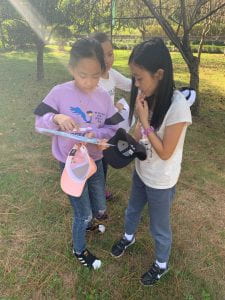 People sometimes ask, “Why is there a need for a Life Skills programme”? To answer this question, we can turn to the work of the World Health Organization:
People sometimes ask, “Why is there a need for a Life Skills programme”? To answer this question, we can turn to the work of the World Health Organization:
“The need for life skills education is highlighted, directly and indirectly, in the Convention of the Rights of the Child. Life Skills education is designed to facilitate the practice and reinforcement of psychosocial skills in a culturally and developmentally appropriate way; it contributes to the promotion of personal and social development, the prevention of health and social problems, and the protection of human rights. It includes the application of life skills in the context of specific risk situations and in situations where children and adolescents need to be empowered to promote and protect their rights.” (‘Partners in Life Skills Education’ WHO/MNH/MHP/99.2)
In the past, aspects of the Life Skills programme were taught through a variety of subjects, including Science, P.E., ICT, and the University Guidance curriculum; however, it was recognised that there was a need to formalise the learning opportunities into a Life Skills programme, and to implement this across the entire school. There was also a need to provide more structured opportunities for students to learn about their physical and mental health development, dealing with change, identity, relationships, their rights, personal safety, and how to protect themselves and others.
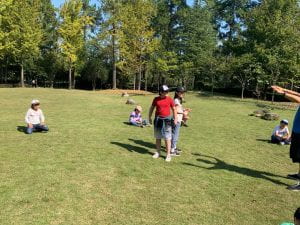 For the Life Skills programme to be successful, the school believes that the entire community must be involved. Therefore, the academic staff must implement this programme with the support of the school leadership, parents, and the wider school community.
For the Life Skills programme to be successful, the school believes that the entire community must be involved. Therefore, the academic staff must implement this programme with the support of the school leadership, parents, and the wider school community.
In Primary, the programme is delivered by all of the classroom and specialist teachers, and can be focused on as a stand-alone topic, or the topic may be embedded into other curriculum areas.
By developing their understanding of Life Skills, Primary students are able to make informed decisions in and outside of school, and they use the skills they have learned to benefit others; for example, by utilising what they have learned in their ‘Transitions’ lessons to help new students make friends and understand the school’s culture. This sets a solid foundation for the curriculum as they move into Secondary, where they cement their Life Skills knowledge.
Life Skills for Secondary Students
The ultimate aim of the Life Skills course for Secondary students is to help prepare them to leave school knowing what it is to be a respectful adult in our society, and how they can contribute positively to the wider community and serve others.
For these older students, Life Skills focuses on helping them form their own identity by developing a better understanding who they are and where they have come from. Through this programme, they build confidence in knowing about and taking care of their own physical, emotional, and social wellbeing, and they develop strategies that will assist them to be resilient in the future.
In addition, the programme reviews the changes that take place throughout adolescence, and helps students learn how they can stay safe, happy, and healthy. They learn about their rights, and ways to stay safe at school, online, and out in the wider community. This is critical, as it is important for young people to understand healthy and unhealthy risk-taking at this age while the brain is still developing, and the Life Skills programme equips students with the tools to make positive decisions.
During their Life Skills class once a week, older students develop their knowledge, understanding, and skills in a comprehensive and integrated manner. They engage in experiential, authentic, participatory, and cooperative learning, and they are focused on how to lead a positive and healthy life and how to be responsible citizens. Through the programme, they widen their life experiences, learn how to deal effectively with interpersonal relationships within various contexts, improve their independent learning skills, and they develop positive attitudes, such as self-discipline, perseverance, and self-confidence. Other benefits include improving students’ thinking skills, imagination, and creativity, and establishing pride in their own culture, while at the same, time, developing an awareness and respect for cultural differences.
For example, the Year 8 students have recently been studying African Djembe Drumming. While learning how to drum, they also discussed concepts like setting up class rules and boundaries, team work, rhythms of life, individuality, harmony, persistence, and resilience. At the same time, the drumming experience was helping the students develop coordination and confidence, and they had fun. For Year 10 and Year 11 students, earlier this semester they participated in a unique sharing experience by writing letters of gratitude to their parents, and the parents also wrote the same for their child. Activities such as these, as the students move from childhood toward adulthood, help them develop a greater perspective for the world around them, preparing them for the next phases of their life, in university and beyond.
For students and teachers at YCIS Pudong, it is an exciting time to be involved in Life Skills, and the programme is continuing to develop, with new resources and learning activities that will benefit all students across all year levels, from the very youngest to the soon-to-be graduates, who will all take away more than just class subject learning from their time at YCIS Pudong – becoming confident, competent, responsible global citizens who will make an impact on the world around them.

